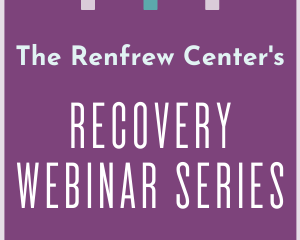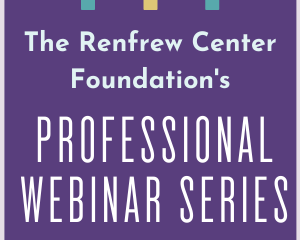Explore Categories

Professional Summer School Series
This summer, The Renfrew Center Foundation is pleased to offer our Summer School Series, an opportunity for mental health professionals to access 5 On-Demand Continuing Education (CE) courses. These powerful presentations will address core issues in the treatment of eating disorders. In this series, Renfrew experts will explore topics which include: Orthorexia Nervosa Weight-Inclusive Care…

Make a Splash in Recovery: Embrace Your Body This Summer
Between barbecues and parties, vacations and swimsuits, the summer months can be tough in their strong emphasis on physical appearance. The Renfrew Center invites you to join us for an interactive workshop where we will explore how summer may impact body image, and how to navigate these months with awareness and tools. Attendees will: Participate…

Make a Splash in Recovery: Embrace Your Body This Summer
Between barbecues and parties, vacations and swimsuits, the summer months can be tough in their strong emphasis on physical appearance. The Renfrew Center invites you to join us for an interactive workshop where we will explore how summer may impact body image, and how to navigate these months with awareness and tools. Attendees will: Participate…

Renfrew Has Pride: SAGE Support Group
The Renfrew Center’s Sexuality and Gender Equality (SAGE) support group aims to provide a safe, nurturing, and empowering space for individuals in the LGBTQIA+ community to move through eating disorder recovery. In recognition and honor of Pride month, join us for this live virtual support group for LGBTQIA+ alumni and community members. This group is…

Gender and Sexuality Expression through the Fluidity of Art
This therapeutic community art session for LGBTQIA+ Renfrew alumni will focus on and honor the intersection of gender, sexuality, and eating disorder recovery. Participants will be invited to reflect on and create art about the meaning of pride, resilience, visibility, and advocacy in our recovery journeys. #RenfrewHasPride: Pride is the promotion of self-affirmation, dignity, equality,…

Renfrew Has Pride: SAGE Networking Group – Meet the Team
Join us for this virtual networking event to meet The Renfrew Center’s SAGE (Sexuality and Gender Equality) team and learn about our LGBTQIA+ programming. This event is an opportunity for professionals to come together and have a conversation about diversity and inclusion, body image and identity concerns, and how to focus on eating disorder issues…

Grieving the Promises of Diet Culture in Recovery (Re-broadcast)
There is a reason that the diet industry amasses billions of dollars every year. It tells us that if we pursue thinness or wellness with enough drive and dedication that things will be easier, better, and brighter. It promises that if we achieve the ideal body, than other challenges won’t be as hard. It makes sense to…

From Self-Criticism to Self-Compassion in Eating Disorder Recovery (Re-broadcast)
Self-compassion is simply the process of turning compassion inward. Many of us may find it easy to be compassionate to others, but difficult to extend that same compassion towards ourselves. We may resort instead to self-criticism or self-doubt. This webinar will explore the concept of self-compassion and its three key elements: self-kindness, common humanity and…

Intuitive Eating in Higher Levels of Care: Laying the Foundation from Day One (Re-broadcast)
Intuitive eating is an evidence-based, self-care eating framework rooted in dignity and respect for all bodies. As this concept has evolved over time, many professionals may question how this approach can be integrated into eating disorder treatment at higher levels of care, in which patients need significant nutritional structure. This webinar will explore and debunk…
Reach Out to Us
Talk with a Program Information Specialist at the number above to learn more about our
services and to schedule an assessment. Or, fill out the information below and we will contact you.
